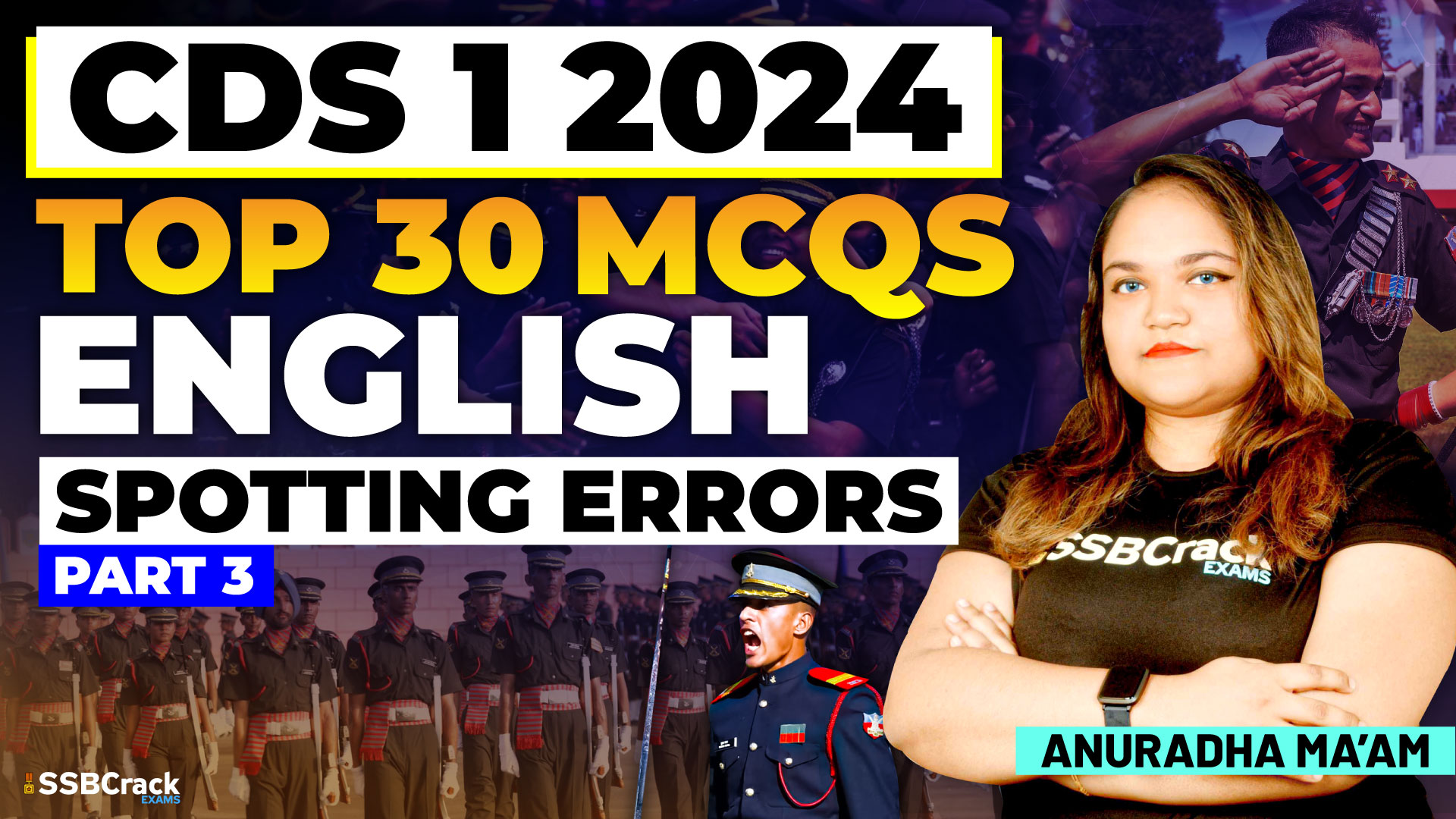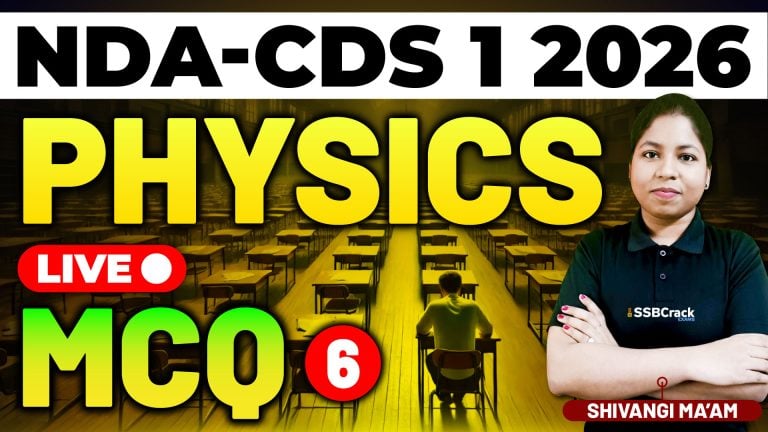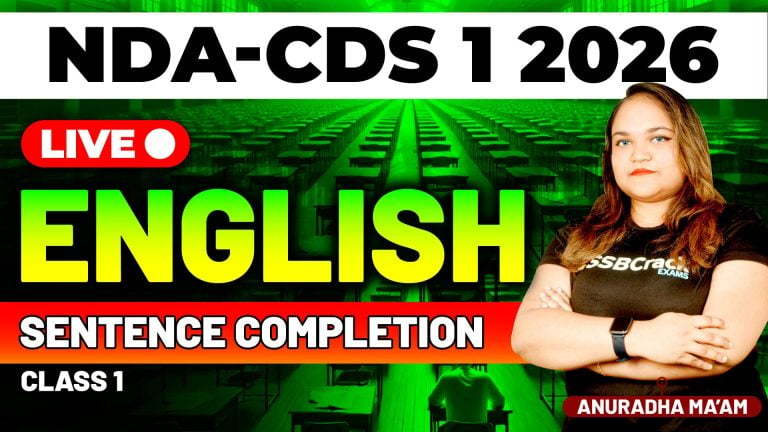The Combined Defence Services (CDS) examination poses a unique set of challenges for aspirants, with the English paper being a crucial component. Among the various topics, “Spotting Errors” demands a keen eye for grammatical nuances and a strategic approach to identify and rectify errors within sentences. This article provides a comprehensive guide on how to effectively solve questions from the Spotting Errors topic in the CDS English exam.
DIRECTIONS: Each item in this section has a sentence with three parts labelled as (a), (b) and (c). Read each sentence to find out whether there is any error in any underlined part and indicate your response on the Answer Sheet against the corresponding letter i.e., (a) or (b) or (c). If you find no error, your response should be indicated as (d).
Q) He lost his new knife (a)/ shortly after (b)/ he bought it. (c)/ No error (d)
Ans. (c)
Q) The ultimate problem of Physics (a)/ is to reduce matter by analysis (b)/ to its lowest condition or divisibility. (c)/ No error (d)
Ans. (b)
Q) By the time (a)/ she finished typing (b)/ it was not hardly ten. (c)/ No error (d)
Ans. (c)
Q) He like (a)/ his companions (b)/ were deceived. (c)/ No error (d)
Ans. (c)
Q) He told me that you had left the school (a)/ a year ago (b)/ and were seeking for a job. (c)/ No error (d)
Ans. (a)
Q) As I prefer coffee than tea (a)/ my friends always take the trouble (b)/ to get a cup of coffee, whenever I visit them. (c)/ No error (d)
Ans. (a)
Q) There has been (a)/ little change in the patient’s condition (b)/ since he was moved to the special ward. (c)/ No error (d)
Ans. (b)
Q) The king was perturbed (a)/ to found evidence (b)/ against his own queen. (c)/ No error (d)
Ans. (b)
Q) They begged her (a)/ not to go but she was determined (b)/ and left the castle. (c)/ No error (d)
Ans. (d)
Q) They cook meal, (a)/ lay the table, (b)/ clean the house and iron the clothes. (c)/ No error (d)
Ans. (d)
For more questions, check out Top 30 Spotting Errors MCQs In English | Part 3 | CDS 1 2024 | UPSC
- Understand the Basics:Before delving into Spotting Errors questions, ensure a solid understanding of fundamental grammar rules. Be well-versed in topics like subject-verb agreement, verb tenses, pronoun usage, and other essential concepts.
- Read the Entire Sentence:One common mistake aspirants make is focusing solely on the underlined part. It’s crucial to read the entire sentence to grasp the context. Errors may be influenced by elements outside the highlighted portion.
- Check for Subject-Verb Agreement:Subject-verb agreement errors are frequent in Spotting Errors questions. Ensure that the verb aligns with the subject in number and person. Watch out for tricky sentences with compound subjects or phrases that might mislead.
- Examine Verb Tenses:Identify the timeframe of the sentence and ensure consistency in verb tenses. Be alert to contextual clues that might indicate a specific time period, requiring a particular tense.
- Pronoun Accuracy:Pronouns must agree in number and gender with their antecedents. Be cautious of ambiguous references and ensure clarity in pronoun usage throughout the sentence.
- Beware of Modifiers:Misplaced or dangling modifiers can subtly alter the meaning of a sentence. Ensure that modifiers are correctly placed and modify the intended word or phrase.
- Consider Sentence Structure:Look at the overall structure of the sentence. Ensure parallelism in lists, correlative conjunctions, and balanced sentence constructions.
- Eliminate Redundancy:Spot and eliminate redundant phrases or words that do not add value to the sentence. CDS questions often test the ability to maintain concise and effective communication.
- Contextual Understanding:Develop the skill of understanding the context within which a sentence is presented. Consider the broader meaning and purpose of the sentence to identify errors that may impact coherence.
- Practice Regularly:Like any skill, proficiency in solving Spotting Errors questions comes with practice. Engage in regular exercises and practice sets to familiarize yourself with common error patterns and refine your analytical skills.
- Mock Tests:Simulate exam conditions by taking mock tests. This helps in honing time management skills and adapting to the pressure of identifying errors within a stipulated timeframe.
- Learn from Mistakes:Review and understand the corrections in questions you get wrong. Identify patterns in your mistakes and focus on strengthening those specific areas during your preparation.
- Utilize Additional Resources:Supplement your preparation with reputable grammar guides, online resources, and reference materials. This provides a broader understanding of grammar rules and strengthens your foundation.
- Stay Calm and Focused:In the exam hall, maintain composure. Read each question carefully, apply your knowledge systematically, and avoid hastily choosing an option without thorough consideration.
Conclusion:
Solving Spotting Errors questions in the CDS English exam is not just about knowing the rules but also about applying them strategically within the given context. By mastering the fundamentals, practicing consistently, and developing a systematic approach, aspirants can enhance their ability to identify and rectify errors effectively. Success in the Spotting Errors segment not only contributes to a higher language proficiency score but also aligns with the broader goal of preparing candidates for effective communication in the dynamic and challenging environments inherent to a career in the armed forces.







